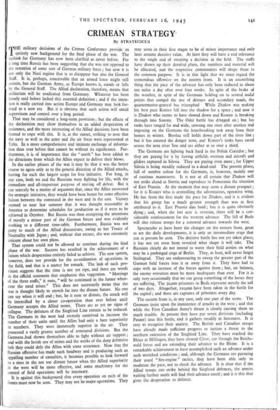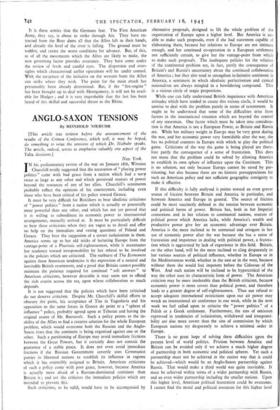CRIMEAN STRATEGY -
By STRATEGICUS
THE military decisions of the Crimea Conference provide an entirely new background for the final phase of the war. The outlook for Germany has now been clarified as never before. For
a long time Russia has been suggesting that she was not opposed to the retention of some sort of German military force ; but now it is not only the Nazi regime that is to disappear but also the General Staff. It is, perhaps, conceivable that an armed force might still remain, but the German Army, as Europe knows it, stands or falls by the General Staff. The Allied declaration, therefore, means that militarism will be eradicated from Germany. Whatever has been loosely said before lacked this essential definition ; and if the inten- tion is really carried into action Europe and Germany may look for- ward to a new era But it is obvious that such action will entail supervision and control over a long period.
That may be considered a long-term provision ; but the effects of the declaration may show themselves in an added desperation of resistance, and the more interesting of the Allied decisions have been framed to cope with this. It is, at the outset, striking to note that the navy as well as the army and the air force were represented at Yalta. In a more comprehensive and intimate exchange of informa- tion than ever before that cannot be without its significance. Fur- thermore, it is of importance that the "north" has been added to the directions from which the Allies expect to deliver their blows.
In the earlier phases of the war it may be that it was the better course to agree only as to the general direction of the Allied attacks, leaving for each the largest scope for free initiative. For long, in any case, both we and the Russians were fighting for life, with the immediate and all-important purpose of staving off defeat. But it can scarcely be a matter of argument that, since the Allies recovered the strategic initiative, they would have been better for some effective liaison between the command in the west and in the east. Victory seemed so near last summer that it was thought reasonable in America to determine schedules for production as if it were to be achieved in October. But Russia was then occupying the attentions of merely a minor part of the German forces and was evidently working to a different time-table. Furthermore, Russia was not party to much of the Allied discussions, owing to her Treaty of Neutrality with Japan ; and, without that excuse, she was extremely reticent about her own plans. That system could not be allowed to continue during the final phase of the war. Success has resulted in the achievement of a liaison which desperation entirely failed to achieve. The new system,
however, does not provide for the co-ordination of operations in the field, and that is a matter for remark. The lack of such pro-
vision suggests that the time is not yet ripe, and there are words
in the official statement that emphasise this suggestion. " Meetings of the three staffs," it runs, " will be continued in the future when-
ever the need arises." This does not necessarily mean that the war is thought likely to stretch far into the distant future. No one can say when it will end ; but, be it near or distant, the attack will be intensified by a closer co-operation than ever before until Germany accepts the Allied terms. There are as yet no signs of collapse. The defences of the Siegfried Line remain to be reduced. The Germans in the west had recently contrived to increase the number of their units until the Allies had only a bare superiority in numbers. They were immensely superior in the air. They possessed a vastly greater number of armoured divisions. But the Germans .had shown themselves able to fight without air support ; and with the lavish use of mines and the works of the deep defensive belt they could defy the Allies with some assurance. Now that the Russian offensive has made such headway and is producing such an appalling number of casualties, it becomes possible to look forward to a time in the not too distant future when the Allied superiority in the west will be more effective, and some machinery for the control of field operations will be necessary. It is against this background that every operation on each of the fronts must now be seen. They may not be major operations. They
may seem in their first stages to be of minor importance and only later assume decisive value. At least they will have a real relevance to the single end of securing a decision in the field. The staffs have drawn up their detailed plans, the numbers and material will be allocated, and the respective commanders will shape them to the common purpose.' It is in this light that we must regard the tremendous offensive on the eastern front. It is an astonishing thing that the pace of the advance has only been reduced to about ten miles a day after over four weeks. In spite of the brake of the weather, in spite of the Germans holding on to several nodal points that compel the use of detours and secondary roads, the quartermaster-general has triumphed While Zhukov was making his best pace Koniev fell into the shadow for a space ; and now it is Zhukov who seems to have slowed down and Koniev is breaking through into Saxony. The Oder battle has dragged on ; but his tanks have ranged far and wide, crossing one river after another and imposing on the Germans the heartbreaking trek away from their homes in winter. Breslau still holds down part of the river line ; but it has entered the danger zone, and Koniev's tanks have raced across the next river line and are either at or over a third.
The Germans are fighting back hard in the Polish Corridor ; but they are paying for it by having airfields overrun and aircraft and gliders captured in Silesia. They are paying even more ; for Upper Silesia is being steadily reduced to a dead-end. The present phase, full of sombre colour for the Germans, is, however, mainly one of cautious manoeuvre. It is not at all certain that Zhukov will not strike ahead at Stettin and reproduce in Pomerania the situation of East Prussia. At the moment that may seem a distant prospect ; for it is Koniev who is controlling the adventurous, operative wing. He has from the first made the pace for Zhukov, and it is evident that his group has a Much greater strength than was at first attributed to it. East Prussia dies hard ; but it is quite obviously dying ; and, when the last acre is overrun, there will be a con- siderable reinforcement for the western advance. The fall of Buda will also release troops for a renewed advance towards the west.
Spectacular as have been the changes on the eastern front, great as are the daily developments, it is only an intermediate stage that can at present be seen. The decisive battle has not yet taken place; it has not yet even been revealed what shape it will take. The Russians clearly do not intend to waste their field armies on what may be a prolonged siege of Berlin. They, at least, will never forget Stalingrad. They are endeavouring to sweep the greater part of the German field forces into it or away from it. They have had to cope with an increase of the forces against them ; but, on balance, the enemy resources must be more inadequate than ever. For it is only very occasionally that we can grasp something of the losses they are suffering. The 30,000 prisoners in Buda represent merely the toll of two days. Altogether, tro,000 have been taken in the battle for the capital ; and there are captures of prisoners every day.
The eastern front is, in any case, only one part of the scene. The Germans insist upon the imminence of attacks in the west ; and this while the First Canadian Army's thrust is clearly causing them so much trouble. At present they have put seven divisions (including Panzer) into this battle, and it gathers steadily in fierceness. It is easy to recognise their anxiety. The British and Canadian troops have already made sufficient progress to initiate a threat to the northern extension of the Siegfried Line. They have reached the Rhine at Millingen, they have cleared Cleve, cut through the Reichs- wald forest and are extending their advance to the Rhine. It is a remarkable achievement to have accomplished such an advance under such wretched conditions ; and, although the Germans are pursuing their usual " fire-engine " tactics, they have been able only to moderate the pace, not to check the advance. It is clear that if the Allied troops can strike behind the Siegfried defences, the armies waiting further south will find their advance eased ; and it is this that gives the desperation to defence. It is these armies that the Germans fear. The First American Army, they say, is about to strike through Aix. They have ex- tracted from the Roer dams all that the Allies left in their hands, and already the level of the river is falling. The ground must be sodden, and create the worst conditions for advance. But, of this, as of all the movements which the Allies are likely to make, the new governing factor provides assurance. They have come under the review of fresh and candid eyes. The dispersion and over- sights which characterised earlier operations will be under control. With the recapture of the initiative on the western front the Allies can strike where they wish. The point for the main attack has presumably been already determined. But, if the " fire-engine " has been brought up to deal with Montgomery, it will not be-avail- able for Hodges ; and it is very improbable that the last has been heard of this skilful and successful thrust to the Rhine.



























 Previous page
Previous page